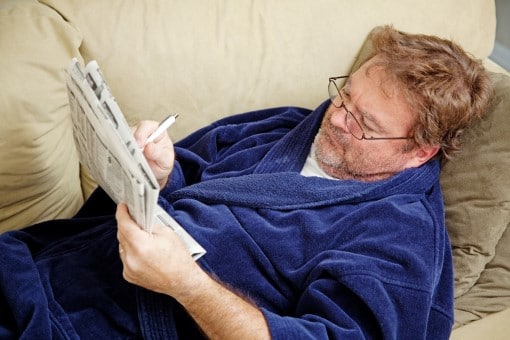
5 sleep tips for riding out coronavirus and a recession
By Jason Wooden, PhD | April 11, 2020
Millions of people are dealing with the dual challenge of staying healthy and earning an income. An uncertain future, tons of stress, and changes to daily life can take a toll on sleep.
To stay at your best, it’s critical that you get quality sleep to keep your immune system in fighting form and your head in the game. We list 5 practical things you can do for your sleep to help you ride out cornavirus and a recession.
Your sleep is way more important than you realize
If your sleep has recently taken a hit from coronavirus or recession worries, you’re not alone.
We’re living in interesting times for sure with the double whammy of a global pandemic and an economic downturn.
During regular times, millions of people struggle with insomnia every night – 1 in 3 adults in the US and over 30% of the adults worldwide.
Right now, I wouldn’t be surprised if the numbers are quite a bit worse with all the uncertainty, stress, and changes to daily life.
Lots of people lost their jobs or homes during the Great Recession.
This time around you have the dual challenge of staying healthy and employed.
Whether you’re still working or one of the millions who has lost a job, you need to be at your best to ride things out.
That means you have to do whatever you can to stay healthy, keep from getting too down or stressed, and keep your head in the game.
That’s where sleep comes in:
Sleep helps keep the immune system in fighting form
Did you know that sleep deprivation can make you more susceptible to infectious agents? If you don’t get enough rest, your body makes fewer cytokines, the proteins that your immune system uses to target infections.
Sleep is also important for mood
Sleep-deprived people have a hard time coping. They’re also more at risk for anxiety and depression.
Sleep helps you get things done
When you’re sleep-deprived, it’s hard to pay attention, focus on tasks, or remember things. This can make it harder to get things done during the day, even simple everyday tasks like cooking dinner.
I think you can see your sleep is way more important than you may realize.
Right now, there’re a lot of things out of your control.
Sleep isn’t. There are things you can change today to help improve your nights.
Let’s take a look at the practical things you can do to improve your sleep and help you ride out the recession.
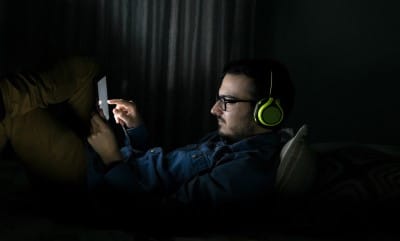
Sleep Tip 1: Watch your sleep hygiene
Okay, this is the foundation for everything else you will do.
If you’re serious about your sleep, you need to make sure you’re practicing good sleep hygiene.
What you do during the day, evening, and at bed time can set the stage for quality sleep. If you do the wrong things, it can make for frustrating nights and mornings.
For better sleep hygiene, you should:
- Keep regular wake up and sleep times
- Avoid naps
- Exercise during the day
- Avoid large meals, alcohol, or stimulants such as caffeine before bedtime
- Maintain a bedtime routine to wind down
- Keep your bedroom quiet, dark, and cool
- Avoid electronics use in the bedroom
Coronavirus and work stoppages have causes changes to the daily routine of millions of people. People are spending more time at home than ever and staying up late binge watching their favorite shows.
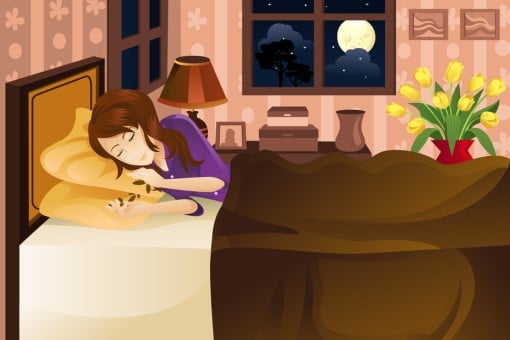
Even so, it’s still important to stick to your normal routine as much as possible so that you get the seven to eight hours of sleep the National Sleep Foundation recommends.
Is your room set up for sleep?
You may need earplugs to block out evening noises or a facemask if you’re dealing with excessive night time lighting. (You can also try white noise.)
Sleep experts recommend that you keep your bedroom temperature between 60- and 67-degrees Fahrenheit (15 to 19 degrees Celsius).
Don’t forget to limit your use of electronics at bedtime. Your TV, tablet, and smartphone emit bright blue light which can wreck your natural sleep cycle and keep you wide awake.
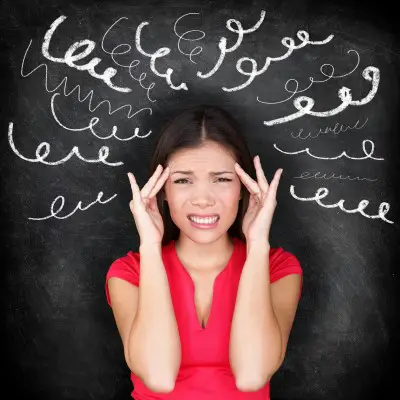
Sleep Tip 2: Keep your stress level down
If you’re feeling stressed and a bit down, don’t be too hard on yourself.
During an economic crisis, it’s natural for the wellbeing of millions of people to take a hit.
However, getting overstressed about things is bad for sleep. It can make it harder to fall asleep and stay asleep.
Worse, there’s a ping-pong effect between sleep and mental health. Stress, anxiety, and depression can make it harder to fall asleep. Poor sleep can lead to more stress, anxiety, and depression.
You don’t want to get into a downward spiral.
Did you know ongoing stress is also bad for your immune system too? It can increase your risk for a cold or the flu.
That’s lots of motivation to do what you can to keep your stress levels down.
There’s plenty you can do:
- focus on the things you control
- limit your intake of news
- take it one day at a time
- keep your sense of humor
- get adequate sleep
- physical activity such as a walk
- relaxation exercises such as yoga, meditation, and deep breathing
- connect with others
- work in a garden
- relaxing music
- play with a pet
- take a long bath
- watch a fun movie
Learn more:
Sleep hygiene checklist with tips
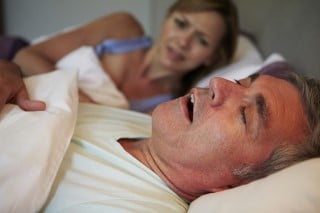
Sleep Tip 3: Keep your sleep apnea under control
Did you know many people suffer from underlying sleep disorders that can affect sleep?
The most common is obstructive sleep apnea, a sleep-related breathing disorder that affects over 18 million adults in the US alone and almost a billion adults worldwide.
It’s a real sleep wrecker and can make for miserable days.
It happens when the muscles in the throat relax too much during sleep causing your airway to collapse and interrupt your breathing. These breathing pauses can limit the supply of oxygen to the body.
As you become more oxygen-deprived, your brain arouses you out of deep restorative sleep into a lighter sleep. In the morning, you wake up feeling as if you haven’t slept at all.
Unfortunately, too many people are living with undiagnosed obstructive sleep apnea. (According to the American Sleep Apnea Association, 80 percent of people with moderate or severe case have never been diagnosed.)
Untreated sleep apnea can undercut your sleep hygiene.
Fortunately, today there’s lots of options once you get diagnosed. They range from traditional CPAP setups to innovative pacemaker devices.
Also, it’s worth checking with your doctor if you dealing with other health issues. Many health conditions and prescription meds can also interfere with sleep.
You’ll sleep better and so will anyone near you.
Learn more:
Sleep apnea diagnosis
The latest sleep apnea treatments
What to do if you don’t have insurance
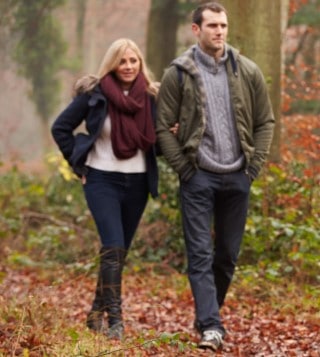
Sleep tip 4: Stay physically active
You may be tempted to binge watch Netflix but going couch potato can come back to bite you.
Besides gaining weight and getting out of shape, a sedentary lifestyle has been linked to depression.
It turns out that going couch potato can also hurt sleep.
On the other hand, physical activity can improve how well you sleep and how long you sleep.
And it’s a great natural stress fighter and mood booster.
So, stay active if you want to sleep better and feel better.
Even if you can’t access your gym or usual outdoor spots, there’s still lots you can do:
- take a walk around the neighborhood
- go for a run
- follow an online exercise class
- do some physically active chores in the house
- do some yard work
Learn more:
Exercise for sleep tips
Mental Health Benefits of Exercise

Sleep tip 5: Get plenty of natural daylight
If you’re spending more time than usual indoors at home, it can affect how well you’re sleeping during the coronavirus craziness and during a recession.
That’s because your body is in tune with day and night through sleep-inducing hormones like melatonin which regulate your sleep-wake cycle. Sunlight signals your body to stop making melatonin which is why it falls during the day and rises as it gets dark.
Experts recommend at least 30 minutes of natural daylight each day. Since sun glasses may limit the eye’s access to full sunlight, it’s important to get some shades-free daylight exposure.
Natural daylight can also boost your mood which is why some people get seasonal depression.
So, be sure to get out each day and get some sunshine.
Go for a walk, hang out in the yard, or read a book on your deck.
Do you live in place where it’s grey most of the time?
As an alternative to natural daylight, you can try light therapy. There are lamps designed to mimic outdoor light which have been tested in clinical studies.
There are also now sleek light therapy glasses with small light-emitting diodes that bring the light source closer to the eye.
You may also be interested in:
Sources:
1. “World Sleep Day Talking Points”, World Sleep Society website
2. The correlation between stress and economic crisis: a systematic review. Neuropsychiatr Dis Treat. 2016; 12: 983–993.
3. “What Happens When Your Immune System Gets Stressed Out?”, 2017, Cleveland Clinic website
4. Sleep Disorders: Sleep-Related Breathing Disorders. FP Essent. 2017 Sep;460:11-21.
5. Estimation of the global prevalence and burden of obstructive sleep apnoea: a literature-based analysis. Lancet Respir Med. 2019 Aug;7(8):687-698.
6. “Sleep Apnea Information for Clinicians”, American Sleep Apnea Association website
7. “Sedentary lifestyle linked to depression”, 2014, Reuters.com
8. “How Exercise Affects Sleep”, National Sleep Foundation website
9. “What Are the Benefits of Sunlight?”, Healthline.com
Connect with us:
About Us
Better Sleep Simplified® was founded as a place for you to get clear and well-researched information.
Our goal is to make sure you know about your options so that you take action sooner rather than later.
Check us out on YouTube:
Watch and Learn
Helpful sleep tips, interesting sleep facts and statistics you want to know about
Affiliate Disclosure
This site is a participant in the Amazon Services LLC Associates Program and other affiliate advertising programs designed to provide a means for sites to earn advertising fees by advertising and linking to them.
Important: BetterSleepSimplified.com is for informational purposes only and is not intended or implied to be a substitute for professional medical advice, diagnosis, or treatment. Always consult a physician for sleep and health concerns. See additional information.
